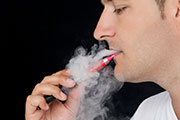
FRIDAY, Aug. 28, 2015 (HealthDay News) — Many parents don’t understand that the liquid nicotine used in electronic cigarettes poses a serious danger to young children, a new survey indicates.
The liquid nicotine used in e-cigarettes is often fruit-flavored, which makes it appealing to youngsters. Consuming a teaspoon of this liquid can be deadly to a child, and smaller amounts can cause nausea and vomiting that require emergency care, experts warn.
Children can also become sick if the liquid nicotine comes into contact with their skin.
“These are largely avoidable risks, but because e-cigarettes are relatively new, many people — including pediatricians — aren’t aware of the dangers or the steps that should be taken to protect children from them,” study first author Dr. Jane Garbutt, a professor of medicine and of pediatrics at Washington University in St. Louis, said in a university news release.
She and her colleagues surveyed 658 parents and guardians at 15 pediatric clinics in the St. Louis area about their knowledge and use of e-cigarettes. Nearly all of them knew about the products, 20 percent had tried them, and about 12 percent said a family member used them.
In two-thirds of homes where children were exposed to e-cigarettes, they were also exposed to regular cigarettes, according to the study published Aug. 25 in the journal Academic Pediatrics.
Thirty-six percent of e-cigarette users did not lock up bottles of liquid nicotine and did not use childproof caps. Liquid nicotine was most often kept in a drawer or cupboard (34 percent), a purse or bag (22 percent) or on an open counter (13 percent), the findings showed.
“Three percent of the people in our study said a child of theirs had tried to drink the e-liquid,” Garbutt said. “The easiest way to lower risk is to store e-liquid out of the reach of children. Open counters and shelves, unlocked drawers, and purses and bags aren’t safe storage places,” she added.
Only 15 percent of e-cigarette users in the study had told their pediatricians they were using e-cigarettes, and only 6 percent of those users said the doctors had explained the use and safe storage of the devices.
“We strongly encourage pediatricians to ask parents about nicotine use, including e-cigarettes, and to discuss the risks of exposure,” Garbutt said.
More information
The American Association of Poison Control Centers has more on protecting children from liquid nicotine.
Copyright © 2026 HealthDay. All rights reserved.

